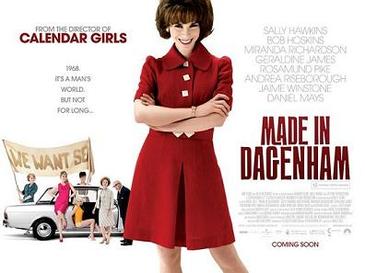
Women didn’t always have equal pay. Back in the mists of time the same work was rewarded differently depending on gender. This movie is an historical about the end of that ancient era where gender was a legitimate basis for pay disparity.
Ancient era = 1968. The precipitating event was the Ford sewing machinists’ strike of that year (wikipedia has the goss). This film dramatises that event, using fictional-amalgam characters but broadly following the course of events.
Broadly is the right word all ’round. It’s done without much subtlety, but there’s a lot of heart on display. It’s a happy-making movie, and while it’s done by the numbers it goes down very easily. A different, harder, fiercer movie could be made out of these events – and maybe deserves to be – but this one is a success on its own terms and a light touch doesn’t do a disservice to the story it tells or the people it depicts.
Considering the amount of female acting talent on display, it’s perhaps cheeky to single out Bob Hoskins as the performance highlight – I could watch his impish, sincere character all day. Sally Hawkins in the lead was solid and engaging, but not as enthralling/infuriating as she was in Happy Go Lucky. (I see why Dan Slevin of the Capital Times doesn’t like her, calling her performances “fussy”, but I don’t mind her style.) Miranda Richardson as iconic Brit politician Barbara Castle didn’t make much impression – whenever the film cut to her it all went flat, because she didn’t have anything to do, although her eventual interaction with the strikers was much more engaging.
So, overall, it’d be a nice night in on the video. Or watch it on the telly when it turns up there. The only exception to this recommendation is one that I heard separately from several older women: take your teenage daughters to this film so they understand that what they take for granted now was hard-won. That sounds like good advice to me.
cut from this blog post: lengthy digression on current gender pay inequality. you’re welcome.
While it’s a good idea to realise that we currently live in a slightly civilised society, I hate the idea that women today should think they’re ‘lucky’ not to be disadvantaged in ways no one should be disadvantaged in.
Not being oppressed should not be a privilege, but a right.
Maire: totally agree. The film actually used exactly that point as the defining issue of its central relationship. (Mild spoiler: the bloke just didn’t see that until it was sharply pointed out to him.)